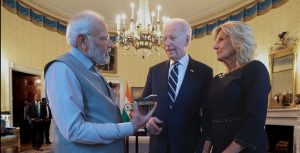On Friday, December 13, it will be 20 years since terrorist groups linked to Pakistan carried out a devastating attack on Parliament.
Five terrorists approached Parliament House Complex around 11:40 am on December 13, 2001, in an Ambassador car with a red light and a fake Home Ministry sticker on the windscreen. One of the members of the Parliament House Watch and Ward Staff became suspicious as the car approached Building Gate No. 12.
When the car was ordered to turn around, it collided with then-Vice President Krishan Kant’s car, prompting the terrorists to exit the vehicle and begin fire. An alarm was triggered, and all of the building gates were shut. All five terrorists, as well as eight security personnel and a gardener, were slain in the ensuing firefight, which lasted more than 30 minutes. A total of 15 persons were hurt.
Also Read | India reprimands Pakistani diplomat over zero progress in 26/11 terror attack trial
Who were responsible?
L K Advani, then Home Minister, said in Lok Sabha, “It is now evident that the terrorist assault on the Parliament House was executed jointly by Pakistan-based and supported terrorist outfits, namely, Lashkar-e-Taiba and Jaish-e-Mohammad.”
He continued, “These two organisations are known to derive their support and patronage from Pak ISI. The investigation so far carried out by the police shows that all the five terrorists who formed the suicide squad were Pakistani nationals. All of them were killed on the spot and their Indian associates have since been nabbed and arrested.”
He added, “Last week’s attack on Parliament is undoubtedly the most audacious, and also the most alarming, act of terrorism in the nearly two-decades-long history of Pakistan-sponsored terrorism in India.”
What happened to those arrested?
On December 13, the police filed a FIR documenting a terrorist attack. Four people were apprehended by the Special Cell of the Delhi Police within days, aided by the clues relating to the car used and cellphone records. Mohammad Afzal Guru, a former Jammu Kashmir Liberation Front (JKLF) fighter who surrendered in 1994, his cousin Shaukat Husain Guru, Shaukat’s wife Afsan Guru, and S A R Geelani, an Arabic instructor at Delhi University, were among those arrested.
Afzal Guru was detained in police custody on December 29, while the trial court acquitted Afsan and sentenced Geelani, Shaukat, and Afzal to death. The execution of Afzal Guru took place 11 years later.
Geelani was found not guilty in 2003. The Supreme Court maintained Afzal’s death sentence in 2005, but shortened Shaukat’s punishment to ten years in jail with hard labour. The court decided that Afzal Guru be hanged on September 26, 2006.
Tabassum Guru, Afzal Guru’s wife, filed a mercy appeal in October of that year, but it was denied by the Supreme Court the next year. On February 3, then-President Pranab Mukherjee rejected his mercy petition, and Afzal Guru was hanged six days later, on February 9, 2013. As the government refused to send over his remains to his family, he was buried at Tihar prison.






